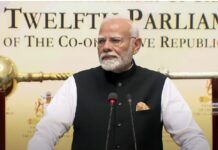India and Canada Forge Stronger Trade Ties
Chandigarh, 11 September 2023: CII Northern Region organised a Conference on Demystifying Trade and Investment in Chandigarh today. The event, held at the CII Northern Region Headquarters, brought together industry leaders, policymakers, and experts to deliberate on the pivotal role that standards play in enhancing India’s exports and the essential preparations required by the industry to seamlessly integrate into global supply chains.
“India is growing at a rate of 7%. At this growth rate, it will continue, and, in a few years, it will become a premium economy. Today, the Indian rupee has become a global currency and I am happy to share that 22 countries are conducting in rupees – which is a matter of great pride for us,” shared Shri Som Parkash, Hon’ble Minister of State of Commerce & Industry, Government of India.
Keeping in view India’s vision of becoming AatmaNirbhar, Production Linked Incentive (PLI) Schemes for 14 key sectors have been announced to enhance exports. Talking about Ease of Doing Business (EoDB), Hon’ble Minister Sir shared that the Government of India has reduced 39000 compliances. Recently, various Acts have been amended – 183 provisions across 42 Central Acts administered by 19 ministries have been decriminalized. Further, he mentioned that the Centre’s initiatives such as the PM Gatishakti and National Logistics Policy aim to reduce the logistics cost from 40 per cent to 10 per cent. More than 24 sectors will be selected for successful implementation of the Logistics Policy, the Hon’ble Minister informed.
“India and Canada are now among the top 9 trading partners for each other. Our two-way bilateral trade in goods and services has bounced back from the COVID pandemic and is now approaching $23 billion. This is a record high for India-Canada relations,” said Mr Patrick Hébert, Consul General – Chandigarh, Consulate General of Canada, Government of Canada.
Negotiations are going on between India and Canada for successful conclusion of Early Progress Trade Agreement, mentioned Mr Hébert. Canada’s Trade Commissioner Service (TCS) and Trade Promotion Service (TPS) have been set up to help companies do business abroad.
Ms Vrindaba Gohil, Commissioner of Customs (Punjab, Himachal Pradesh and Union Territory of Chandigarh), Customs Commissionerate – Ludhiana, Central Board of Indirect Taxes & Customs, Ministry of Finance, Government of India, encouraged businesses to leverage the Manufacturing and Other Operations in a Customs Bonded Warehouse (MOOWR) scheme. She also highlighted the benefits of the Authorised Economic Operator (AEO) scheme, which streamlines customs procedures and is currently undergoing changes to enhance the efficiency of the supply chain further.
Shri Utpal Kumar Acharya, Joint DGFT – Chandigarh, Punjab, Himachal Pradesh, Jammu & Kashmir, Leh Ladakh, shared insights into India’s ongoing discussions with Canada for Free Trade Agreements (FTAs) and highlighted the issuance of Certificate of Origin without any fees by DGFT to facilitate trade and exports. He also discussed the Amnesty Scheme, a government initiative aimed at supporting exporters.
Additionally, Shri Acharya announced that Post Offices would serve as export centres for transactions up to INR 5 lakhs, with plans for future expansion, and urged industry stakeholders to communicate their concerns to government officials and monitor government websites for updates.
During the welcome address, Mr Amit Thapar, Chairman, CII Northern Region Task Force on Exports and President, Ganga Acrowools Limited, emphasized the need for the manufacturing sector to produce world-class products at world-class prices. The Northern Region has immense potential to grow in agro-based products. MSMEs also have a great potential to grow, added Mr Thapar.
Mr Anurag Gupta, Vice Chairman, CII Chandigarh UT and Managing Director, Usha Yarns Limited, concluded the event by expressing the continued benefits of WTO-compatible schemes for exporters.
The Inaugural Session was followed by a Panel Discussion on ‘Non-Tariff Barriers: Going beyond just Technical Standards,’ exploring the impact of varying quality standards, improving national quality infrastructure, sustainability in Non-Tariff Measures, and the challenges posed by comprehensive FTAs.
















